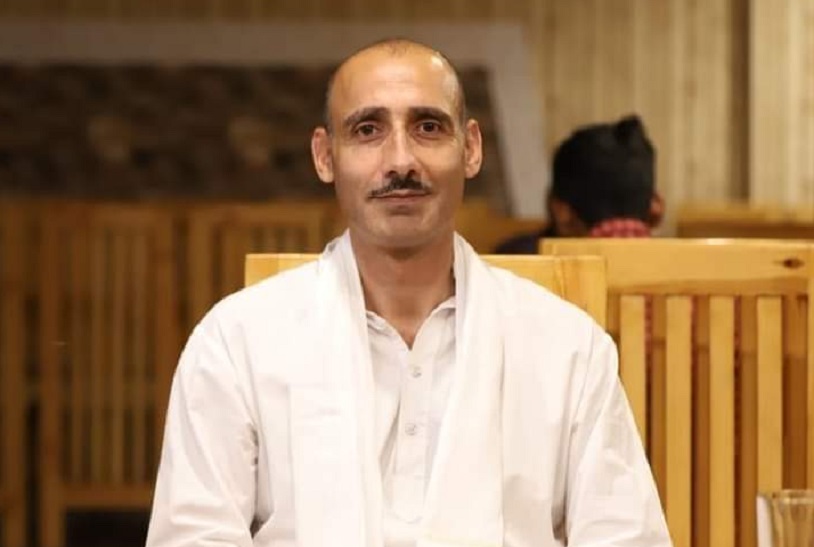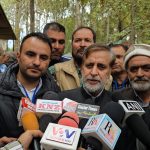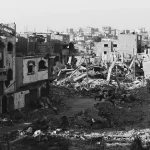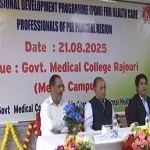Srinagar, Oct 08: Prominent rights activities Irfan Hafeeq Lone who won from Wagoora-Kreeri Assembly Constituency as Indian National Congress candidate Tuesday vowed to deliver citizen-focused governance saying people have taken a mature decision.
After his victory, Lone in a public gathering expressed his gratitude to the people, promising to work diligently to meet their expectations and ensure justice.
“I will fight for the people’s cause until my last breath, and I take pride in that. I will do my best to fulfill the hopes of the people. Many young people are still struggling to get their verifications completed on time, which is a grave injustice,” he stated.
He also highlighted plans to provide free electricity to the poor and subsidized power to others. Addressing the challenges faced by Kashmir’s apple industry, which supports 70% of the region’s population, Lone vowed to prioritize both the apple and tourism sectors.
“We will focus on the apple and tourism industries in the region and ensure that the concerns of the people are presented at the relevant forums,” he added.
Lone further remarked that the people’s decision was a clear response to the BJP’s proxies, emphasizing that the incoming government would be people-friendly, working to meet the public’s expectations and counter the BJP’s agenda.
In the Wagoora-Kreeri Assembly seat, 12 candidates were in the race, including Syed Basharat Ahmad Bukhari of the PDP, Independent candidates Naseer Ahmad Rather and Safina Baig, and Rehana Begum from Janata Dal (United).
However, the primary contest was between Irfan Hafeeq Lone of the Indian National Congress and Syed Basharat Ahmad Bukhari, a former Law Minister. Lone secured 17,002 votes, while Bukhari garnered 9,251 votes, giving Lone a decisive lead. Bukhari had won from Sangrama Assembly constituency representing PDP in the 2014 Assembly election.
Independents like Naseer Ahmad Rather have also made a notable impact, garnering over 6,355 votes, which reflects a fractured voting pattern in the region.
As the results were declared for the assembly constituencies of Gulmarg and Kreeri-Wagoora in Jammu and Kashmir, the dynamics of the races revealed interesting trends.
In Gulmarg, the Indian National Congress (INC) candidate Pirzada Farooq Ahmad Shah emerged victorious with a thumping majority of 26,984 votes.
In Gulmarg, there were 13 candidates in the fray including Ghulam Hassan Mir of Jammu and Kashmir Apni Party, Shabir Ahmad Mir of PDP and Adil Nazir Khan as independent.
The primary contest was between Pirzada Farooq Ahmad Shah and Ghulam Hassan Mir. Notably, Mir has 22,793 votes in the assembly constituency.
Ghulam Hassan Mir was elected to the Gulmarg constituency in 2002 as a PDP candidate. He was a law minister in Ghulam Mohammad Shah led cabinet and minister of tourism in the Mufti Mohammad Sayeed led cabinet from 2002 to 2006.
Shortly after his victory, Pirzada Farooq Ahmad Shah addressed a public gathering, declaring his win as the “people’s victory” for Tangmarg.
“The people have made their decision for change through their votes. From the very beginning, we knew the public was with us. The youth, too, have stepped forward for change and have rejected the enemies of Kashmir,” he said.
Shah acknowledged several pressing issues in the Gulmarg constituency, including rising unemployment and the challenges faced by those involved in the tourism industry, which he promised to bring to the attention of the authorities.
“I am committed to implementing the manifesto we promised the people. I will work tirelessly for public welfare and will not disappoint the people,” he said.
As the final results of J&K Assembly elections were declared, voters in Tangmarg Assembly Constituency have expressed their expectations from their chosen candidate seeking to focus on the tourism industry which is the backbone of the region’s economy.
The voter turnout and the demographics, especially after the delimitation, have shifted the political calculations in the region. The Gulmarg seat holds symbolic significance due to its strategic importance and tourism industry influence.
This Assembly Election marked a critical juncture for both constituencies as the first Jammu and Kashmir Assembly elections post the abrogation of Article 370, and the results will reflect the political sentiments in the valley.
The Jammu and Kashmir Assembly election conducted after a gap of ten years was held in three phases, on September 18, September 25, and October 1.







